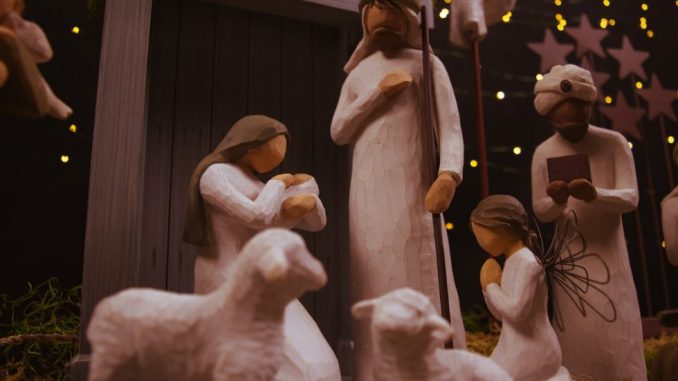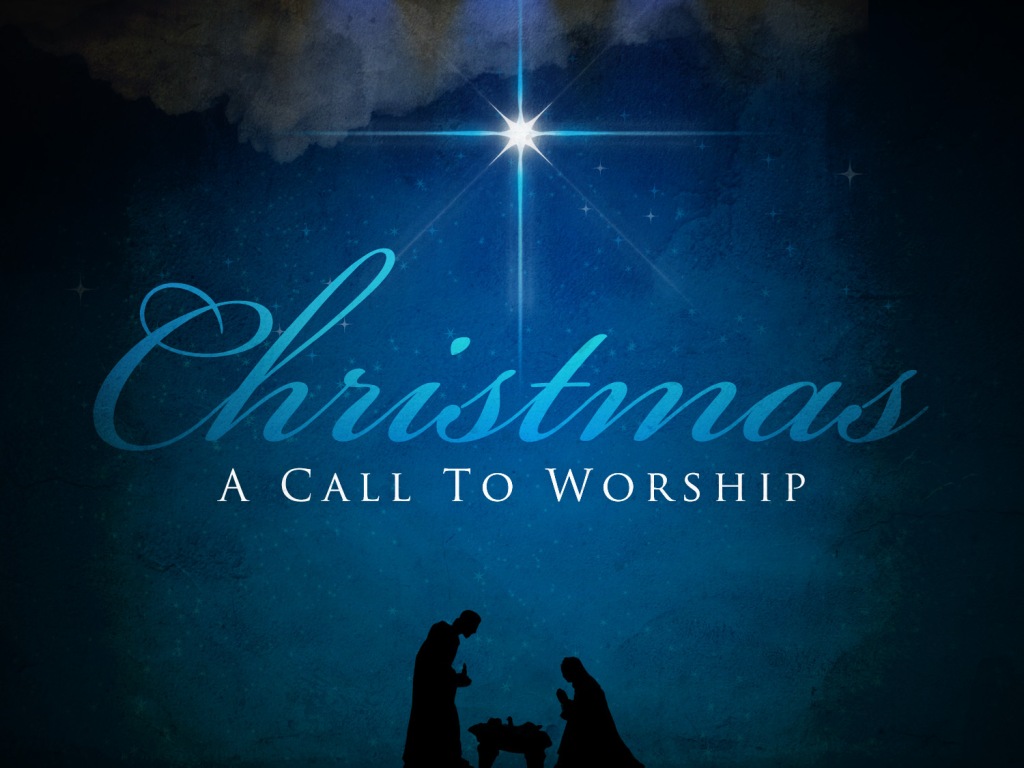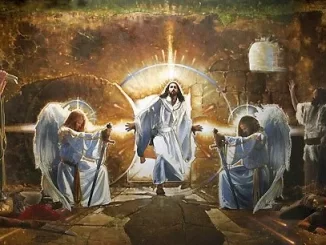
How should we respond to Christmas? The Bible’s answer may be summed up by the word “worship.” One key word for “worship” in the New Testament refers to “the act of prostration in homage or reverence”.1 This act of service or devotion is rendered by rational creatures to God alone. The command to worship God alone is repeated throughout Scripture. But how should we view this exhortation in light of the Christmas season? How has Christmas added to our understanding of the worship of God?
God Alone Is To Be Worshipped
When Moses “bowed his head toward the earth and worshiped” God on Mount Sinai (Exodus 34:8), the Lord commanded Him: “you shall worship no other god” (Exodus 34:14).2 Jesus reiterates this command to Satan in the temptation: “You shall worship the Lord your God and him only shall you serve” (Matthew 4:10). The angel who ministered to John at Patmos rebuked John when he attempted to worship him: “You must not do that! I am a fellow servant with you and your brothers the prophets, and with those who keep the words of this book. Worship God” (Revelation 22:9). Hence, this command to worship God alone was not merely an edict to Israel or to humanity at large, but to the entire created order itself – even to angels. In fact, the angels demonstrated their commitment to this command by swiftly striking dead the Judean king Herod Agrippa I when he received praise for having the voice of a god (Acts 12:23). Clearly, there is some intolerance among the angelic host when a creature is worshipped in the place of God.
The Christmas Command
In view of this biblical command to worship God alone, why do Christians worship Jesus Christ? Christians worship Christ for the two main reasons that they worship God alone: firstly, because the Bible explicitly teaches that Jesus is God (John 1:1), and secondly, because God commands his creatures to worship Christ. Hebrews 1:6 expresses this divine command: “And again, when he [God] brings the firstborn into the world, he says, “Let all God’s angels worship him.”
This command in Hebrews 1:6 to worship Christ entails:
- a specific time (when this command was given),
- a specific subject (who must worship)
- and a specific object (who is to be worshipped).
The time this command was issued was when God “brings the firstborn into the world”. This is a reference to the incarnation or the birth of Christ, or Christmas. The specific subject or audience this command is addressed to are “all God’s angels” The entirety of the angelic host are the ones who must worship the specific object of worship. This object of worship is God’s Son (or “firstborn”) whom He brings into the world on Christmas. To sum up, the “Christmas Command” is a command given at Christmas to all of God’s angels to worship his Son Jesus Christ.
From Scripture, we see how seriously God views right worship and how strongly the angels react against the worship of a creature other than God. What then, are we to make of this Christmas Command by this same God to the angels to worship a child born on Christmas? It signals to us the great importance of the one the angels are worshipping that night – Jesus Christ.
The Command Fulfilled
When we read the story of Jesus’ birth in the Gospel of Luke, we see the angelic fulfillment of this Christmas Command. On that first Christmas, when Jesus was born, the night was lighted up with the glory of God as an angel delivered “good news” to “shepherds out in the field” nearby (Luke 2:8-10). What followed was a remarkable sight of “a multitude of the heavenly host praising God and saying, “Glory to God in the highest, and on earth peace among those with whom he is pleased!” (Luke 2:13-14). These same angels, who would later be responsible for the death of Herod for receiving a form of worship, had offered their praises to Christ. They demonstrate for us the appropriate creaturely response to Christmas.
In reflecting on the angelic obedience to God in worshipping Christ, we must ask if the Christmas Command was given merely to angels? If so, why does Scripture record both the command (Hebrews 1:6) and its fulfillment (Luke 2:13-14) for us? It is because the Christmas Command was not given exclusively to angels, despite them being its first recipients. Instead, the Christmas Command is God’s decree to all his creatures. You and I are commanded to join with the angels in worshipping the Son of God. When we turn to the opening chapters of the New Testament, we find that “wise men from the east came to Jerusalem, saying, ‘Where is he who has been born king of the Jews? For we saw his star when it rose and have come to worship him’” (Matthew 2:1-2). When we turn to the final chapter of the New Testament, we see “the throne of God and of the Lamb will be in it, and his servants will worship him” (Revelation 22:3). The New Testament begins and ends with the worship of Christ, the Lamb of God. The worship of Christ is not insignificant. It is the foundation upon which the New Testament is founded on. The Christmas Command gives us God’s perspective on Scripture, as everything in Scripture ultimately points the reader to the worship of Christ.
Responding Rightly At Christmas
There is a tendency to think of Christmas as merely something God gives to us. While that is certainly true (see John 3:16), it is not what Christmas is primarily about. Ultimately, Christmas is about God giving a people to his Son whom he loves (John 17:2, 9). These people whom the Father gives to his Son will be with his Son to behold his glory and to worship him with the angels. As Jesus prayed to his Father: “Father, I desire that they also, whom you have given me, may be with me where I am, to see my glory that you have given me because you loved me before the foundation of the world.” (John 17:24).

In closing, here are three questions for us to reflect on this Christ:
- What is your response to the Christmas Command?
- Have you seen the glory of Christ as the incarnate Son of God?
- Have you joined with the angelic host to worship Christ in obedience to the decree of God?
The hymn, “O Come All Ye Faithful” wonderfully summarizes our response:
Sing, choirs of angels, sing in exultation,
sing, all ye citizens of heav’n above!
Glory to God, all glory in the highest:
O come, let us adore him,
O come, let us adore him,
O come, let us adore him, Christ the Lord!3
Wishing you a blessed Christmas!

About Samuel Nesan
Samuel Nesan graduated with a Masters in Christian Studies (Seminari Theoloji Malaysia) while serving as an Associate Pastor at Pantai Baptist Church. Prior to that, he graduated with a Bachelor of Theology and a Diploma in Counselling Studies (Bible College of Malaysia). Samuel left his pastoral position in 2018 and went on to start and work full-time by faith in Explain Apologetics. Samuel is a regular speaker at schools, colleges, universities, and churches across denominations. He has also participated in a plethora of interfaith dialogues and debates. Apart from ministry, Samuel enjoys Badminton and was a match commentator for Astro since 2014 having coached professional shuttlers both locally and abroad.
|Share The Good News|




Leave a Reply